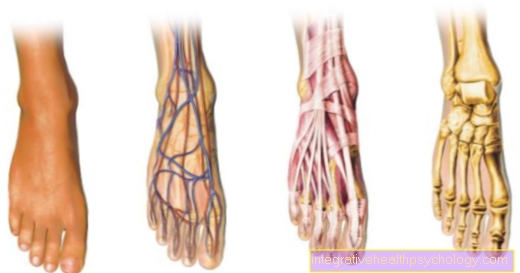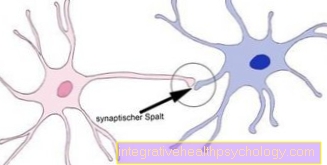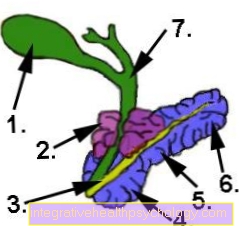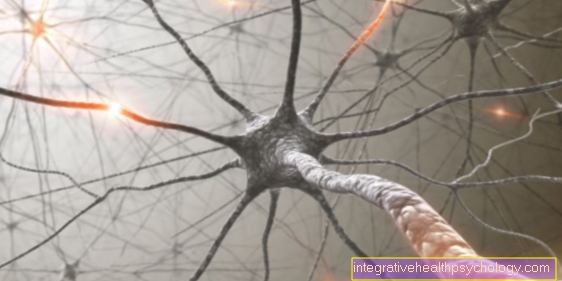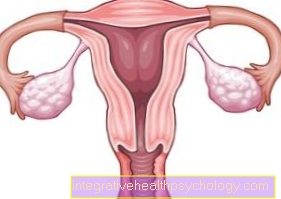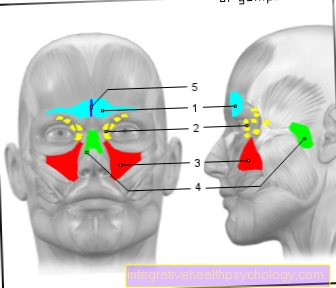Desire for children
introduction
The desire to have children is a topic that will overtake many couples in the course of their relationship.What both partners should consider beforehand, what precautions must be taken, when is the best time to stop taking the pill and what else is important to know can be found in the following.
You might also be interested in: unfulfilled desire to have children

What should be considered beforehand?
If you want to have children, it makes sense to contact your gynecologist and have various medical diagnostics carried out. This includes the exclusion of infectious diseases such as toxoplasmosis. This is a parasitic disease transmitted through cat feces.
The disease usually heals without major complications in immunocompetent patients, but an initial infection with Toxoplasma is a serious complication during pregnancy that can lead to serious damage to the unborn child. Therefore, it makes sense to find out whether you are immune to the disease. 95% of people who have been infected with toxoplasmosis in the past become immune for life after the disease has healed and will no longer be infected again.
If a pregnant woman is not immune to toxoplasma, she should take additional precautions for the duration of the pregnancy to prevent an initial infection during pregnancy. Other diseases worth investigating are the cytomegalovirus, HIV, chlamydia, syphilis, and others.
Apart from infectious diseases, it also makes sense to look out the vaccination certificate and present it to the doctor. He can use the passport to check the vaccination status. Particular attention should be paid to the vaccination against rubella, chickenpox (varicella), whooping cough (pertussis) and measles.
Tips if you want to have children
A healthy, balanced lifestyle is very important during pregnancy in order to create the perfect conditions for the child to thrive. A healthy lifestyle is also an advantage in advance, as it increases the chance of ovulation and successful conception.
Sometimes less is even more, because intense competitive sport and a body fat percentage that is too low are not helpful in turning the desire for children into reality. But obesity and insufficient nutrition could also stand in the way of having children. So here again the healthy middle ground is the recipe for success.
The emergence of a new life is a small miracle and it can sometimes take longer, sometimes less. Couples should, in the best case, not put too much pressure on themselves. Stress, in particular, can have a negative impact on the release of various hormones that are important for conception, making it more difficult to have children.
Read more on the topic: How do I get pregnant?
When should you stop taking the pill if you want to have children?
In general, pregnancy is possible immediately after discontinuing a hormonal contraceptive. Unfortunately, there is no rule of thumb here that can calculate for a woman how long it will take for her personally.
Every woman reacts differently to stopping the pill and every body needs a different amount of time to normalize its own hormone production again. After stopping the pill, it is possible that the cycle regulates itself in a very short time.
But it is also possible that the body needs a little longer. In extreme cases, this can take up to a year. It should be noted that a missed menstrual period is initially not a sure sign of a "natural contraceptive protection", since the mucous membrane is often very little built up after taking progestogen-based pills and therefore no menstrual period worth mentioning occurs, but ovulation may have taken place.
Tablets if you want to have children
There are various vitamin, mineral and other dietary supplement tablets, such as Femibion®, that pregnant women can take in order to be optimally supplied with all the important nutrients.
Women who want to have children are particularly often advised to take folic acid. In the best case scenario, folic acid should be taken before pregnancy, as sufficient quantities are required for certain developmental processes in the growing child.
Of course, dietary supplements are not a substitute for a healthy, balanced diet, but they are useful from the time you are planning your pregnancy, as certain vitamins are necessary to a large extent during pregnancy and it is difficult to get them through diet alone.
In addition to folic acid, many other minerals are of course also important. This also includes the supply of iodide in order to ensure a functional thyroid. It is also important to ensure that enough iron and zinc, but also omega-3 fatty acids and other vitamins, are consumed.
Read more on the topic: Vitamins in Pregnancy
When are the fertile days?
In order to get pregnant as quickly as possible, apart from ovulation, it is important to have sexual intercourse at the right time.
This should take place regularly during the fertile days in order to make the best possible use of the cycle. Generally, 5-6 days per cycle are considered fertile. These are distributed around ovulation. The greatest chance of successful conception is three days before to the immediate day of ovulation.
In order to record the exact time of the fertile days, it is advantageous if a woman can interpret the signs of her body well. Methods such as ovulation computers, which measure certain hormone levels in a woman's urine, can be used here.
Cheaper, well-tried methods such as assessing the cervical secretion, basal temperature and palpation of the cervix can also be learned by women and make it easier to determine the fertile period. Women who have a very regular cycle also have it a little easier because they can easily calculate the time of ovulation.
Read more on the topic: fertile days and Test for ovulation
How often should you have sexual intercourse?
When the fertile days are just around the corner, they should be used if you wish to have children. Here it is usually enough to have sexual intercourse every two to three days. Too infrequent sexual intercourse reduces the chances of successful fertilization of the egg. At the same time, however, very frequent sexual intercourse does not make sense either, since the proportion of sperm in the ejaculate then decreases.
Treatment options for unfulfilled desire to have children
If a pregnancy does not occur, women or couples should contact a gynecologist or a fertility clinic. They will do various tests to find out the possible cause of the lack of pregnancy. This includes blood tests as well as ultrasound procedures or more invasive procedures. To rule out hormonal imbalances, various hormones are determined in the blood. These include the laboratory levels of the hormones FSH, LH, estrogen and progesterone.
The determination of various male hormones (androgens) is also useful, since too high a quantity can also be the cause of a lack of ovulation, as can be the case, for example, with polycystic ovarian syndrome (PCOS).
If the pituitary gland produces too much prolactin, it can be a cause of temporary infertility. A fertility specialist will also check your thyroid levels, as both an overactive and underactive thyroid can make getting pregnant more difficult.
In addition to hormonal imbalances, anatomical features can also be the cause of the unfulfilled desire to have children. Certain underlying diseases can make conception difficult, for example due to adhesions in the case of endometriosis or sticking of the fallopian tubes in the case of an infection with chlamydia or other inflammation of the fallopian tubes.
Since the patency of the fallopian tubes cannot be determined with an ultrasound examination alone, various methods can be used for this. There are invasive and non-invasive procedures for this, such as chromopertubation (invasive), in which various diseases of the internal genital organs and the impermeability of the fallopian tubes can be ruled out by means of a color solution in the course of a laparoscopy.
An equivalent, but much less invasive, method for fallopian tube patency is hystero-salpingography, in which the contrast agent can be visualized with the help of ultrasound and thus shows the patency of the fallopian tubes.
Each process has its advantages and disadvantages. The attending physician will decide together with the woman concerned what examinations and diagnostic measures are suitable for her. Of course, it should not be forgotten that the unfulfilled desire to have children should not only be clarified on the part of the woman, but the cause could also lie with the partner. It therefore makes sense to have the man's sperm quality checked by an andrologist at the same time as the examinations of the woman.
Depending on which individual cause leads to the unfulfilled desire to have children, different fertility treatments can be sought. The methods range from hormone treatments to increase fertility to the direct introduction of the sperm into the uterus (insemination) to the various methods of artificial insemination.
Hormonal stimulation of the ovaries is particularly useful for women with certain hormonal disorders. The aim of the procedures is to mature good follicles in the ovary, which are then made to jump at the right time. The stimulation takes place through various drugs that stimulate the maturation of the egg cells. These are often combined with other hormones to prevent the egg cells from jumping prematurely.
If the sperm concentration in the ejaculate is low, functional disorders in the sense of difficult locomotion or poor conditions for sperm survival in the vaginal environment, insemination can be the method of choice. The male ejaculate is processed in the laboratory so that the basic conditions are as favorable as possible. Then, during the fertile period, the sperm are introduced into the woman's uterus using a syringe or catheter.
When people speak of “artificial insemination” in the vernacular, they mostly mean processes in which the egg cell is fertilized outside the female body and the embryo is first reinserted into the uterus. There are different procedures for this:
In-Vitro-Fertilization (IVF): In IVF, the woman is first given hormones that stimulate the ovaries to allow follicles to mature. If several follicles in the ovaries are large enough, they are removed by a doctor and combined with the partner's prepared sperm. In IVF, the eggs are fertilized by the sperm itself. The fertilized egg cells then continue to mature. Those who reach a certain stage of cell proliferation and division will be shortlisted for embryo transfer. When the fertilized eggs have developed enough, up to three of them can be transferred to the uterus.
If the quality of the sperm is insufficient to fertilize the egg itself, intracytoplasmic sperm injection (ICSI) can still be used. The method is very similar to IVF, but not several sperm are brought together with the egg cell, as is the case with IVF, but a single sperm is injected directly into an egg cell in the laboratory. This procedure can also be used to transfer up to three embryos into the uterus.
Read more on the topic: artificial fertilization
Summary
Nowadays there are many ways to help a couple achieve their baby happiness. It is important to find out in advance what you can do personally to increase fertility and create the best starting conditions for the desire to have children. At the gynecologist, women or couples can get advice on possible therapies and approaches. The support of a specialist can be useful, especially if you do not want to have children.
When trying to get pregnant, women should look for the best basic conditions for themselves and their baby. Getting enough vitamins and other important nutrients is just as important as having adequate vaccinations and a healthy lifestyle.







